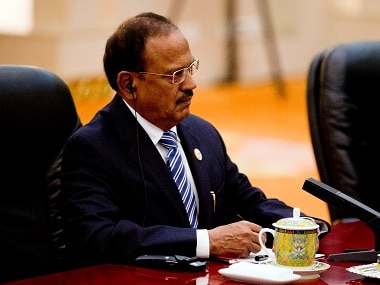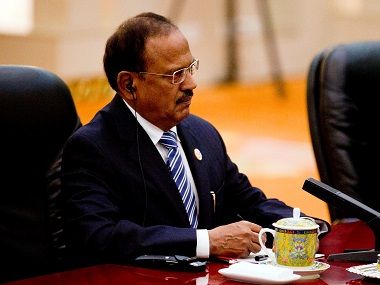Recent moves by the government in the area of security seem to show that officials are implementing reforms from a ’lessons learnt’ perspective, with an overall objective of ensuring swiftness in decision-making. This includes the designation of RN Ravi, erstwhile chairman of the Joint Intelligence Committee as deputy national security advisor (DNSA), in addition to the existing DNSA post held by the formidable former Research and Analysis Wing (R&AW) chief Rajinder Khanna and the newly-appointed serving officer Pankaj Saran. Earlier, a Defence Planning Committee was set up to coordinate decision making on a wide span of matters related to military and national security planning. Chaired by the National Security Advisor (NSA) Ajit Doval, it got off to a quick start with the first meeting held in May this year. Now comes the cherry on top. The government has decided to revive the Strategic Policy Group, once chaired by the Cabinet Secretary, but now
rejigged to have the NSA as its head
. That’s going to cause some heartburn within the corridors of power. [caption id=“attachment_4070307” align=“alignleft” width=“380”] File image of India’s national security advisor Ajit Doval. Reuters[/caption] Most media reports focused on the fact the chairing of the SPG makes the NSA
the most powerful bureaucrat in the country
. This may not entirely be true. The NSA’s remit is on national security matters only, with the Cabinet Secretary retaining his powerful status at the head of the bureaucracy. What this move does ensure however, is that the traditional functioning of bureaucracy — one minister to one ministry — is also extended to national security. This long-overdue reform that will hopefully put everyone, including senior bureaucrats, on the same page when it comes to deciding on measures required to ensure the country’s core interests. For far too long, the question of what constitutes national security has been left to each ministry to interpret. The result has been chaos and delay, not to mention turf wars and a “my minister says so” complex, which derailed critical decision-making. The heartburn among bureaucrats — and possible criticism from naysayers — arises from the fact that “national security” is now being defined widely in most countries to encompass everything from environment to health. Experts, including some within the government, have argued for this wider definition by arguing that each of these are vital as components of ‘comprehensive national power’. But here’s the thing: Such wide definitions have only occurred in the West (from where we copy-paste most things) after the demise of the Soviet Union. The core members of National Security Councils or their equivalent in countries such as the US are still dominated by the core ministries (or principals). In the US, the National Security Act of 1947 that set up the NSC, still holds. That means its core members are the Departments of Defence, Energy and Finance. Its remit is simple, which is to “advise the president with respect to the integration of domestic, foreign, and military policies relating to the national security so as to enable the military services and the other departments and agencies of the government to cooperate more effectively in matters involving national security”. Later administrations have since expanded the list usually as a reaction to some significant event — such as after the 11 September, 2001 attacks, when the Department of Homeland Security was created. India has chosen not to define national security, but the interpretation by previous governments tended towards the wider definition. The truth of the matter however is that India does not have the luxury (or the resources) to widen the definition of national security beyond traditional parameters. The neighbourhood is just as unsafe — or probably worse — with the end of the Cold War. This reality is apparent in the composition of the SPG, which includes the deputy NSAs, the three chiefs, the core ministries (Home, Finance, Defence, External Affairs) as well as NITI Aayog, Departments of Space, Atomic Energy, Revenue, and Defence Production.
File image of India’s national security advisor Ajit Doval. Reuters[/caption] Most media reports focused on the fact the chairing of the SPG makes the NSA
the most powerful bureaucrat in the country
. This may not entirely be true. The NSA’s remit is on national security matters only, with the Cabinet Secretary retaining his powerful status at the head of the bureaucracy. What this move does ensure however, is that the traditional functioning of bureaucracy — one minister to one ministry — is also extended to national security. This long-overdue reform that will hopefully put everyone, including senior bureaucrats, on the same page when it comes to deciding on measures required to ensure the country’s core interests. For far too long, the question of what constitutes national security has been left to each ministry to interpret. The result has been chaos and delay, not to mention turf wars and a “my minister says so” complex, which derailed critical decision-making. The heartburn among bureaucrats — and possible criticism from naysayers — arises from the fact that “national security” is now being defined widely in most countries to encompass everything from environment to health. Experts, including some within the government, have argued for this wider definition by arguing that each of these are vital as components of ‘comprehensive national power’. But here’s the thing: Such wide definitions have only occurred in the West (from where we copy-paste most things) after the demise of the Soviet Union. The core members of National Security Councils or their equivalent in countries such as the US are still dominated by the core ministries (or principals). In the US, the National Security Act of 1947 that set up the NSC, still holds. That means its core members are the Departments of Defence, Energy and Finance. Its remit is simple, which is to “advise the president with respect to the integration of domestic, foreign, and military policies relating to the national security so as to enable the military services and the other departments and agencies of the government to cooperate more effectively in matters involving national security”. Later administrations have since expanded the list usually as a reaction to some significant event — such as after the 11 September, 2001 attacks, when the Department of Homeland Security was created. India has chosen not to define national security, but the interpretation by previous governments tended towards the wider definition. The truth of the matter however is that India does not have the luxury (or the resources) to widen the definition of national security beyond traditional parameters. The neighbourhood is just as unsafe — or probably worse — with the end of the Cold War. This reality is apparent in the composition of the SPG, which includes the deputy NSAs, the three chiefs, the core ministries (Home, Finance, Defence, External Affairs) as well as NITI Aayog, Departments of Space, Atomic Energy, Revenue, and Defence Production.
This is an integrative body designed to power up security objectives, and for that there is a huge need for a steady hand on the tiller. This new designation will hopefully go some way towards ensuring this.
There is however, the need for more reform to ensure that the foundation of the National Security Architecture, which is the National Security Council Secretariat (NSCS), is able to respond to these new changes with full-blooded capacity. Although ably served by deputationists from different ministries, it still needs a core national security staff, that includes subject experts on geographic or issue-based areas. It is true that the Intelligence Bureau and R&AW have formidable in-house talent. But neither of these organisations have the time, resources or capacity for continuity to ensure that subject matter expertise is nurtured and retained. The NSCS should ideally be that repository providing ‘on-demand papers’ based on an increasingly elusive “all-source intelligence”. This includes assessment of not only the several hundred intelligence reports that come in every day, but also the vast wide world of the internet. This means pretty much sitting at a desk 24x7, and a near obsession with your subject. The trouble is that security/intelligence analysts are a much misunderstood and underrated breed in most countries. The overall impression among the hard core intelligence agencies is that they “neither toil or spin” since their world is poised delicately between intelligence and information. Steve Coll, in his book Directorate S: The CIA and America’s Secret Wars in Afghanistan writes of counter-terrorism analysts in the CIA itself who were overburdened, reviled and looked upon with suspicion, leading to their warnings on 9/11 being ignored. In a world of an overabundance of information, fake or carefully planted news, not to mention the phantasm that beckons called “big data”, the need for a large and dedicated body of analysts — call them ferrets if you will — to patiently read, analyse and then inform is vital. They may well be that vital nail, for lack of which an entire kingdom was lost. The author is former director of the National Security Council Secretariat
)